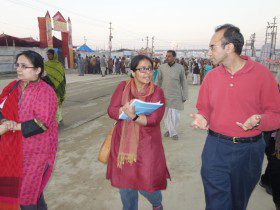On August 13th, Tarun Khanna, Director of the South Asia Institute and the Jorge Paulo Lemann Professor at the Harvard Business School, led a discussion on“Mobile Technology: Spurring Social and Economic Enterprise in South Asia,” during his visit to Bangalore. The event was hosted by Rajiv Mody,the Chairman and Managing Director of Sasken Communication Technologies, at his residence and drew an eclectic audience of technologists, entrepreneurs, investors, Harvard alumni, and thought leaders.
Professor Khanna opened the discussion by addressing how the use of mobile technology phones has become ubiquitous in South Asia- not only as a tool to close the information gap, but as a powerful device to promote economic growth in emerging markets. The discussion hoped to broaden the understanding of mobile technology and how it can enable economic and social mobility, particularly for those most in need, through improvements in healthcare, education and financial services. Professor Khanna focused on the society-changing potential of mobile technologies and, in particular, on specific mobile applications currently used in developing markets, such as Afghanistan, Bangladesh and India, that have demonstrated a proven impact on social development.
Professor Khanna posited that while developing mobile technology is important, what remains the most compelling and complex issue is to understand the needs and the behavior of the societies that the mobile technologies are aiming to serve. Professor Khanna used examples of mobile projects centered on health and banking to provide insights into what makes mobile solutions successful and scalable. Examples cited included India’s Novopay, Bangladesh’s bKash and Kenya’s M-pesa that provide mobile banking solutions; India’s Janacare and Bangladesh’s Grameenphone that use mobile technology to deliver healthcare solutions.
While mobile technologies have enormous potential, Professor Khanna felt that there are still a lot of open questions. For example, social-business projects need sustainable business concepts, which in turn require substantial financial support and investment. Since governmental support in the Indian economy is crucial, the added value of collaboration between governments and social businesses is important, as without collaboration, governmental regulations may limit innovation. Professor Khanna’s research found that in African countries where regulations have not been enforced or introduced yet, entrepreneurs have quickly turned lack of regulation into beneficial business opportunities.
The data and research work done during the Kumbh Mela was also discussed, which provided insights for further research and teaching on understanding social networks and behavior through studying large data gathered from cell phones used at this mass gathering. Issues about governmental, institutional and regulatory guidelines were addressed to highlight the existing tension between data privacy, sharing of data to promote scientific research, and the potential insights this data may be able to generate. (For more information on the Kumbh Mela Big Data project please visit https://mittalsouthasiainstitute.harvard.edu/mobile-technology-background/)
Professor Khanna closed by communicating that mobile technology is one of several interfaculty projects SAI is coordinating over the next several years; teaching and learning about neuroscience and addressing gender violence in South Asia are others that are ongoing with partner institutions in India.


